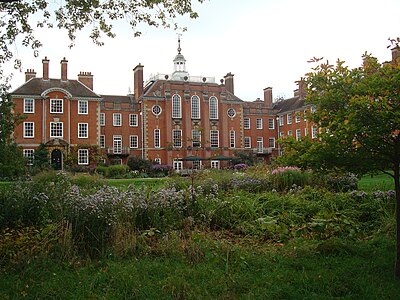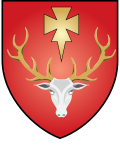Portal:University of Oxford
| Main page | Indices | Projects |
The University of Oxford portal
The University of Oxford is a collegiate research university in Oxford, England. There is evidence of teaching as early as 1096, making it the oldest university in the English-speaking world and the world's second-oldest university in continuous operation. It grew rapidly from 1167, when Henry II banned English students from attending the University of Paris. After disputes between students and Oxford townsfolk in 1209, some academics fled north-east to Cambridge where they established what became the University of Cambridge. The two English ancient universities share many common features and are jointly referred to as Oxbridge.
The University of Oxford is made up of thirty-nine semi-autonomous constituent colleges, four permanent private halls, and a range of academic departments which are organised into four divisions. Each college is a self-governing institution within the university, controlling its own membership and having its own internal structure and activities. All students are members of a college. Traditionally, each of Oxford's constituent colleges is associated with another of the colleges in the University of Cambridge, with the only exceptional addition of Trinity College, Dublin. It does not have a main campus, and its buildings and facilities are scattered throughout the city centre. Undergraduate teaching at Oxford consists of lectures, small-group tutorials at the colleges and halls, seminars, laboratory work and occasionally further tutorials provided by the central university faculties and departments. Postgraduate teaching is provided in a predominantly centralised fashion.
Oxford operates the Ashmolean Museum, the world's oldest university museum; Oxford University Press, the largest university press in the world; and the largest academic library system nationwide. In the fiscal year ending 31 July 2023, the university had a total consolidated income of £2.92 billion, of which £789 million was from research grants and contracts.
Oxford has educated a wide range of notable alumni, including 30 prime ministers of the United Kingdom and many heads of state and government around the world. 73 Nobel Prize laureates, 4 Fields Medalists, and 6 Turing Award winners have matriculated, worked, or held visiting fellowships at the University of Oxford, while its alumni have won 160 Olympic medals. Oxford is the home of numerous scholarships, including the Rhodes Scholarship, one of the oldest international graduate scholarship programmes. (Full article...)
Selected article
The 158th Boat Race, an annual side-by-side rowing race between crews from Oxford (pictured after the race) and Cambridge along the River Thames, took place on 7 April 2012. Despite Cambridge having the heavier crew, Oxford were pre-race favourites after a successful preparation period, including a victory over Leander. Cambridge won the toss and chose to start on the Surrey side of the river. Partway through, with the boats level, the race was temporarily halted to avoid injury to protester Trenton Oldfield, who swam in front of the two crews. After the race was restarted, one of the Oxford crew suffered irreparable damage to his blade following a clash of oars with the Cambridge boat, ending Oxford's chances of victory. The race was eventually won by Cambridge by four-and-a-quarter lengths, in a consolidated time of 17 minutes 23 seconds. Immediately after completing the race, a member of the Oxford crew collapsed, but later recovered. Oldfield was later jailed for six months for causing a public nuisance, and as a result of the disruption, security for subsequent Boat Races was increased. (Full article...)
Selected biography
Selected college or hall
Hertford College can trace its history back to 1282 as "Hart Hall", one of the university's academic halls which was linked to Exeter College for many years, but it does not have a continuous history. During the 18th century, the institution suffered a severe decline leading to its dissolution, and the site and buildings were taken over by Magdalen Hall (founded 1448), another academic hall associated with Magdalen College. Hertford was established as an independent foundation in 1874 by Act of Parliament, with the help of a benefaction from the banker Thomas Charles Baring. Some of the buildings date from the 17th century, but others (including the "Bridge of Sighs" across New College Lane) were built by the architect Thomas Graham Jackson in the late 19th century. The college is in Catte Street, opposite the Bodleian Library. It has about 600 students (undergraduates and postgraduates), and the Principal is the historian John Landers. It was one of the first of the men's colleges to admit women. Fellows of the college include the historian Roy Foster and the philosopher Peter Millican, and alumni of the college or its predecessor institutions include the Prime Minister Henry Pelham, the newsreader Fiona Bruce, the archeologist Bernard Ashmole and the American judge Byron White. (Full article...)
Selected image

Did you know
Articles from Wikipedia's "Did You Know" archives about the university and people associated with it:
- ... that economist Barbara Ward (pictured), an early advocate of sustainable development, was the first woman ever to address a synod of Roman Catholic bishops?
- ... that Sir Albert Napier was described as the "midwife to civil legal aid"?
- ... that academic Anastasios Christodoulou was named 'Anastasios' ('Resurrection') by his parents as he was born on Easter Day?
- ... that cricket writer Gerald Howat won the Cricket Society's Golden Jubilee award for his biography of Learie Constantine?
- ... that William Wroth founded the first independent chapel in Wales in 1639, after he refused to obey King Charles' instruction to allow sports to be played on Sundays?
Selected quotation
Selected panorama
Wikimedia
The following Wikimedia Foundation sister projects provide more on this subject:
-
Commons
Free media repository -
Wikibooks
Free textbooks and manuals -
Wikidata
Free knowledge base -
Wikinews
Free-content news -
Wikiquote
Collection of quotations -
Wikisource
Free-content library -
Wikiversity
Free learning tools -
Wikivoyage
Free travel guide -
Wiktionary
Dictionary and thesaurus















